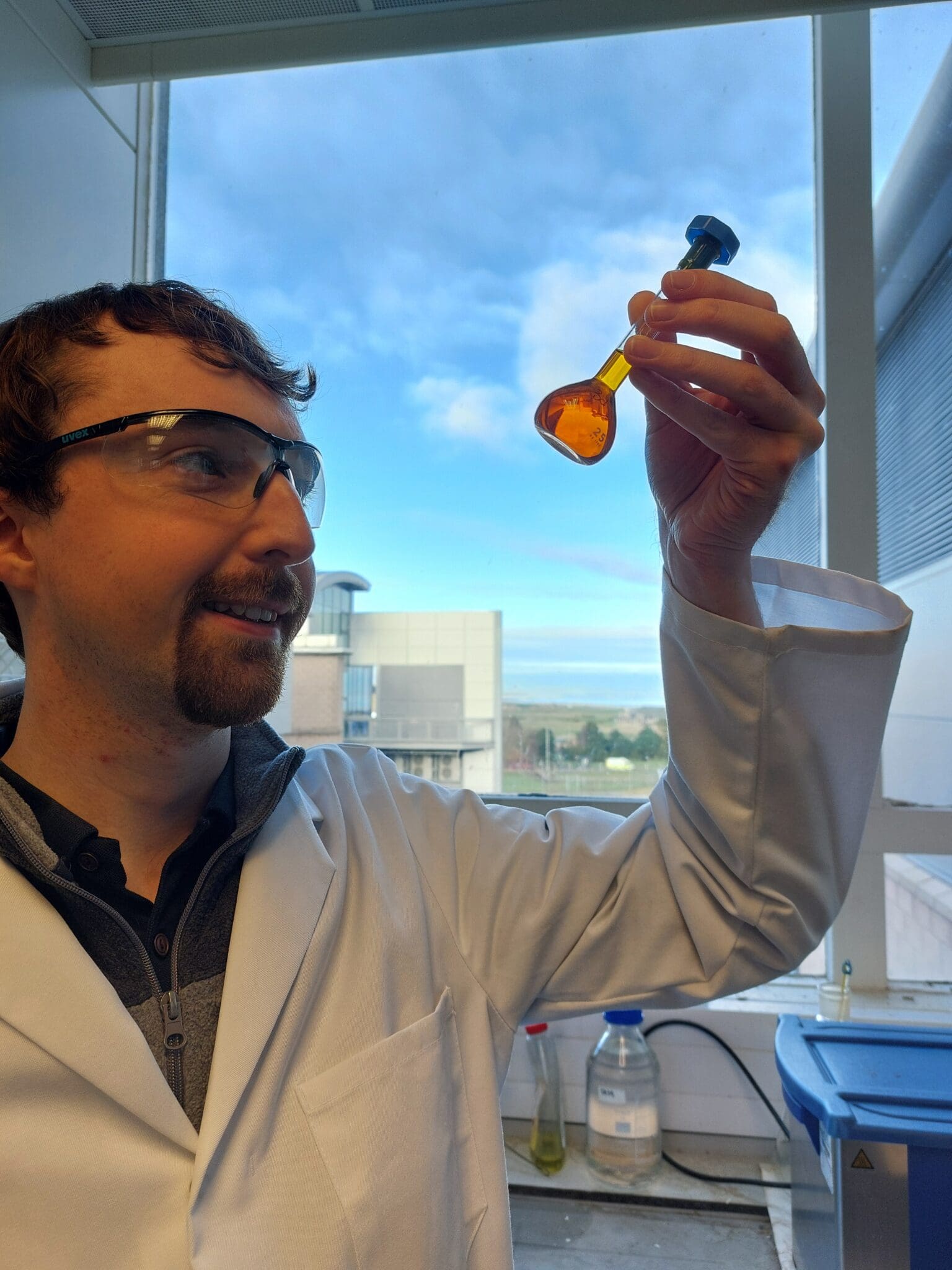Analysis
The ability to analyse complex feed streams and product mixtures is of paramount importance in the development of commercially viable products and processes. We pride ourselves on being able to identify and apply the right technique or combination of techniques to achieve this goal.
Electrospray Ionisation Mass Spectrometry:
Our Bruker ElectroSpray Ionisation (ESI) micrOTOF-Q II Mass Spectrometer allows the analysis of a range of diverse samples from single component species requiring high mass accuracy and/or structural identification via MSn (via use of collision cell), through to characterisation of complex mixtures such as commercial production samples. The instrument has a range of 50 20,000 m/z and an accuracy <5 ppm over the entire range. It has a CryoSpray Ionisation (CSI) source for ESI at low temperatures. The ionisation temperature ranges from -100 °C to +350 °C. The instrument is connected to a glove box which allows meaningful analysis of air/moisture sensitive samples. Furthermore, techniques have been developed to allow real-time monitoring of reaction progress by direct feed of reactor contents into the mass spectrometer.
Gas Chromatography:
Agilent Technologies, Eight Agilent 7890 refinery gas analysers (3 channel, 2×TCD, 1×FID) are currently in operation for the analysis of complex mixtures of hydrocarbons (olefins, paraffins, oxygenated compounds, etc.). Four further instruments (Agilent 6890); one quadrupole benchtop GCMS and three standard split / split-less injectors with FIDs are standalone instruments mostly fitted with PONA columns, but other columns (e.g. INNOWAX etc.) are also available for different applications. Shimadzu QP2010 Ultra GCxGC-MS, Our Shimadzu Comprehensive GC-MS (GCxGC-MS) System comprising of a combination of fast scanning, high-sensitivity quad GCMS-QP2010Ultra and the Zoex Corporation series of modulators, ZX-1 or ZX-2. The QP2010Ultra quadrupole mass spectrometer is able to scan fast enough to fully characterize 100 ms to 600 ms peaks created by the modulation process. An added capability is the chemical ionization and negative chemical ionization for molecular ion spectral analysis and electrophilic compound selectivity. The spectra generated by quad-MS are easily matched using the standard commercially available libraries.
3 High Performance Liquid Chromatography (HPLC-UV/RI):
The Shimadzu Prominence, a fully automated system with high speed injection for large numbers of samples (via a heated auto sampler), consists of a number of modular units; i.e. System Controller CBM-20A, Solvent Delivery Unit LC-20A, Auto-Sampler SIL-20A, Column Oven CTO-20A (20-80oC), UV-VIS detector SPD-20A, Refractive Index Detector RID-10A, On-line Degassing Unit DGU-20A, Low-pressure gradient unit, High Pressure Switching Valves. A fraction collector (FRC-10A) is also fitted which enables accurate fraction collection even when the peak elution time varies, by catching the target component according to variations in the chromatogram. These pure fractions can then be analysed by NMR, IR or MS. LabSolutions software allows for the fast and efficient operation and processing of data
High Performance Gel Permeation Chromatography (GPC):
The Shimadzu Prominence GPC/SEC unit operates from the same platform as the HPLC allowing easy transition between operations enabled by high pressure switching valves. Fitted with robust Phenogel™ size exclusion columns (50 500 Å) composed of highly cross-linked polystyrene-divinylbenzene (PSDVB), the system allows for high resolution and tight linear calibration. Columns are temperature stable up to 140 °C which is important for applications involving solutes with limited solubility at ambient temperatures, or where solubility considerations demand the use of viscous solvents such as DMF or DMSO. This temperature stability is particularly useful when analyzing polymers such as polyethylene and polypropylene which require higher temperatures.
Ametek Mass Flow Indexer (MFI):
Flow rate corresponding to low molecular weight and vice versa. The MFI consists of a small die (2 mm diameter) inserted into an extruder. A weight is applied to the heated extruder containing molten material and a sample of the melt is taken after the desired period of time and is weighed accurately. The MFI is expressed as grams of polymer per 10 minutes of flow time, for the given weight applied . Viscosity of viscous/melted solids can be measured for sample sizes from 0.5 to 10 g between temperatures of 20 °C and 200 °C, using a weight set from 210 g to 21 kg.
Mettler Toledo DL32 Coulometric Karl Fischer Titrator:
The Karl Fischer equipment is used to determine water content in the range of 1 ppm – 5 % present in various organic compounds like hydrocarbons/chlorinated hydrocarbons, alcohols/phenols, ketone, ether, esters and bio-oils. The detection limit is approx. 10 mg per sample (equivalent to 1 ppm water for 10 g sample). The repeatability of analysis depends on the size of the sample and the range of water content.
In This Section
- Analysis
- Characterisation
- Design and Synthesis
- Testing

In This Section

“We value our collaboration with the group; not only have they brought to bear their considerable and complementary technical expertise but have shown an open minded willingness to get involved in areas of technology entirely new to them. Together we have rapidly generated exciting new results.”

